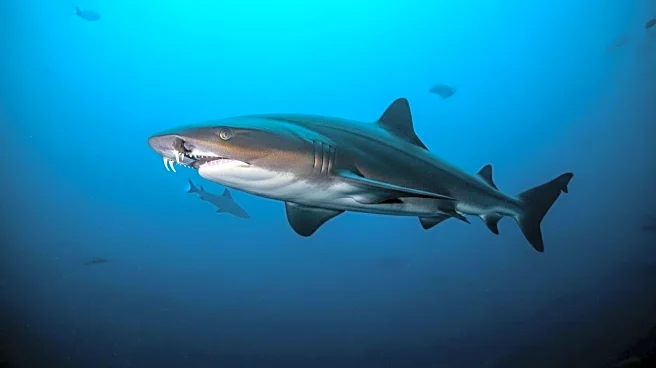What's Happening?
Researchers have uncovered the evolutionary significance of a unique feature in male ghost sharks, known as chimaeras, which are deep-sea fish related to sharks and rays. These fish possess a rod-like structure on their foreheads covered with retractable teeth, called a tenaculum. This structure is used during mating to help males hold onto females, similar to how sharks use their mouths and teeth. The study, conducted by scientists from the University of Florida, University of Washington, and University of Chicago, revealed that these forehead teeth are genuine and develop outside the mouth. Fossil evidence dating back 315 million years and genetic analysis confirmed that the tenaculum teeth activate the same genes responsible for oral teeth production. The findings were published in the Proceedings of the National Academy of Sciences.
Why It's Important?
This discovery highlights the evolutionary flexibility and adaptability of species, showcasing how existing biological structures can be repurposed for new functions. The ability of ghost sharks to develop teeth outside their mouths for reproductive purposes provides insight into the dynamic nature of tooth development. This research could have broader implications for understanding evolutionary processes and the genetic mechanisms behind tooth formation. It also opens up new avenues for studying the evolutionary history of chimaeras and their relatives, potentially influencing future research in marine biology and evolutionary science.
What's Next?
The study suggests further exploration into the genetic and developmental pathways that allow for such unique adaptations in marine species. Researchers may investigate other deep-sea creatures to uncover similar evolutionary traits. Additionally, the findings could inspire new studies on the genetic manipulation of tooth development, potentially impacting fields like dentistry and regenerative medicine. The scientific community may also focus on the ecological roles of chimaeras and their interactions within marine ecosystems, contributing to conservation efforts.
Beyond the Headlines
The discovery of forehead teeth in ghost sharks raises questions about the ethical considerations of genetic research and manipulation. Understanding the genetic basis for such adaptations could lead to advancements in biotechnology, but also poses challenges regarding the potential for genetic engineering in other species, including humans. The study exemplifies the complexity of evolutionary processes and the need for responsible scientific exploration.










